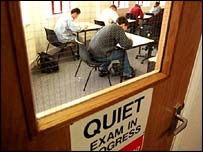
Those taking the tests are among the brightest sixth formers
|
Too many candidates for university law places have produced "poor quality" work in an admission test introduced this year, a report says.
Eight institutions are using the National Admissions Test for Law - involving multi-choice questions and essays - to choose between candidates.
The average multi-choice score was 13.16 out of 24 and the lowest was 3.
A Bristol University study of the 4,345 candidates found many "were unable to construct reasoned arguments".
It urged said admissions tutors wanted to see schools "return the construction of argument" to sixth form learning.
'Learn to make arguments'
The tests were introduced because courses were heavily over-subscribed by high-achieving A-level students.
Universities complain that it is often difficult to distinguish between different "A-grade" candidates.
 |
LAW SCHOOLS INVOLVED
Birmingham
Bristol
Cambridge
Durham
East Anglia
Nottingham
Oxford
University College London
|
In the first test, men did slightly better than women, scoring an average 13.37 in the multi-choice section, compared with 13.02.
The top mark, achieved by four candidates, was 21.
Independent school pupils did slightly better than those from grammars.
They in turn got a slightly higher mark on average than those from comprehensives, who did better than candidates from further education and sixth form colleges.
'Reassuring'
Dr Phil Syrpis, chairman of the LNat Consortium and admissions tutor at Bristol, said: "The test appears to have worked well, producing a good spread of results.
"The most reassuring aspect of the test is that it does not appear to have discriminated inappropriately between candidates.
"The differences that do appear between categories of candidates are generally too small to be statistically significant, and some differences - for example between the sexes and across different types of schools - are very small indeed."
The relative absence of a gender difference contrasts with the law A-level.
In last year's results, A grades were awarded to 19.3% of women's entries across the UK and only 14.1% of men's.
A good test result does not, in itself, secure admission to one of the universities.
The study found that the weight given to the multiple-choice and essay components varied significantly.

